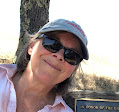Okay, so I’m a Natalie Goldberg fan, which is why I schlepped out in February snow in Iowa City to hear her read at Prairie Lights, the city’s lovely independent bookstore whose name is derivative of City Lights in San Francisco.
Good thing I couldn’t find a parking spot close to the store because that meant I was running late, which meant that just as I stepped into the crowded room where Goldberg was waiting to read, she was beckoning in vain for some polite audience member to take the one empty chair to her left. It was just like being in a classroom: no one wanted to sit in front of the teacher. She mocked a stern face because of her unaccepted gift, and so I finally walked up and sat down. That meant that for one hour I sat just six feet away from my avatar. Her Writing down the Bones had helped give me permission to call myself a writer about fifteen years ago, and her In Living Color helped launch me just two years ago into the realm of visual journaling.
Good thing I couldn’t find a parking spot close to the store because that meant I was running late, which meant that just as I stepped into the crowded room where Goldberg was waiting to read, she was beckoning in vain for some polite audience member to take the one empty chair to her left. It was just like being in a classroom: no one wanted to sit in front of the teacher. She mocked a stern face because of her unaccepted gift, and so I finally walked up and sat down. That meant that for one hour I sat just six feet away from my avatar. Her Writing down the Bones had helped give me permission to call myself a writer about fifteen years ago, and her In Living Color helped launch me just two years ago into the realm of visual journaling.

I expected Goldberg to be on the soft-spoken side – I mean, she is a Zen Buddhist practitioner, after all – but she was vibrant and brassy, exaggerating her great east-coast accent even though she’s lived many years in Minnesota and New Mexico. She wore a black shirt and pants and had wrapped herself in a deep red pashima with colorful stripes – the perfect contrast to her jet black hair and eyebrows.
Goldberg read from her new book, Old Friend from Far Away, but she also did a lot of talking about writing and fielded questions from the audience. (Including a sweet question from a twelve-year-old budding writer: “What do you do when you get bored with what you’re writing?” “That’s your monkey mind,” Goldberg patiently explained. “Your business is to keep writing in spite of your mind jumping all over the place like that.”)
I was most inspired by Goldberg’s comment that writing talent “is like a water table under the earth. When you practice writing, it comes up through you.” With two book proposals in development, I also took note of her advice that when you’re submitting a book proposal or manuscript to an agent, you submit it not to please them, but in the hopes that they recognize the deep truth you’re trying to tell through your writing.
The audience was mostly filled with UI college students, probably including a few Writers’ Workshop students. Someone asked her how she felt about writers’ workshops. She said that she felt neutral about these MFA programs that have become so popular across the country. “What I’m teaching,” she said, “is ‘a priori’ writing. That is, I’m giving you a backbone so you can stand up to the criticism in writers’ workshops.”
Indeed, that’s exactly what I’ve gained from reading Natalie Goldberg’s books: backbone enough to begin to call myself a writer, to teach writing for a decade in a community college, and, now, to be a full-time freelance writer, editor, and writing coach. I didn’t come up through the writers’ workshop ranks; I went the less expensive, “practical” route of training to become a teacher with a master’s degree in composition and rhetoric. I still rely more heavily than I’d like on commercial writing and editing for a living (technical, marketing, and practical documents), but once in awhile I hit a literary bulls eye, and so once in awhile I get to feel like a Writer with a capital W for a few moments, at least.
I agree with Natalie Goldberg, that writing talent can “come up through you” with practice and with the help of supportive readers, teachers, editors, coaches, or other mentors. I am so grateful to her for planting that seed in my mind a decade and a half ago.

No comments:
Post a Comment